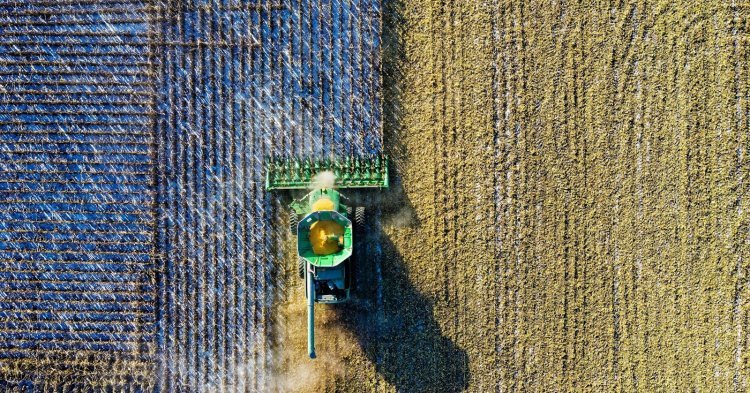If you had lunch today, you should care about the CAP
Agriculture matters to all of us. It provides food, creates direct or indirect employment for millions of Europeans and shapes the landscapes we live in. Agricultural models are also tightly related to the climate crisis. Indeed, farming activities produce around 17% of EU Greenhouse Gas (GHG) emissions, which is twice as much as the industrial sector.
Additionally, intensive farming practices are linked to a massive use of pesticides and fertilizers. This results in a drastic decrease of biodiversity in agricultural crops but also in wild species. The ecosystems surrounding the field are essential to maintain food production in the medium and the long run. A striking example are bees, which pollinate. In the space of just a year, bee numbers declined by over 15%. Nonetheless, there are agricultural practices that can ensure food security while maintaining high productivity with a drastically lower impact on the environment. Agroecological systems that include agroforestry, permaculture and organic farming should be part of the solution for a fairer and more sustainable agricultural system.
In addition to being one of our most important levers of change for sustainable agriculture in Europe, the next CAP is one of the most important EU policies, making up a third of the total EU budget for the next seven years. Its financial implications are huge, as are the balance of interests behind it. The process for this new CAP (for upcoming budgetary period 2021-2027) began in June 2018, before the European Green Deal, with the presentation of legislative proposals for the CAP by the European Commission. In 2019, the CAP file was assessed by both the Committee on Agriculture (AGRI) and the Committee on Environment, Public Health and Food Safety (ENVI), who held opposite opinions. In a nutshell, AGRI supported a weak CAP whereas ENVI pushed for a more ambitious text on climate and biodiversity.
The stakes were high - not only for the environment and our health, but also for our farmers. The CAP has been shown to amplify social injustices, as European small-scale farmers (generally those using more sustainable practises, and who represent 65% of all farmers) get less than 20% of the budget. 25% of EU farms went bankrupt between 2003 and 2013. What will we do when they all disappear?
During last week’s plenary, the EP voted on the 2018 CAP reform proposal. In parallel, the Council of the European Union, agreed on its own position on 21st October. As we show below, they have not fulfilled their duties.
How did we end up with an outdated and incoherent CAP?
The CAP Commission proposal was brought forward in 2018. MEPs started negotiating between the different parliamentary committees. As this process was not successful, it transformed into a discussion between political parties. The three major EP political groups, the conservative European People’s Party (EPP), the Socialists and Democrats (S&D) and the liberals (Renew) agreed to a “backroom deal” which gave “a kiss of death to the relatively-ambitious Farm to Fork strategy”. Since the three parties hold a majority in the Parliament between them when they agree, their joint support left no opportunity for the Greens and Left MEPs to push for environmentally friendly measures.
The CAP is at the core of upholding EU climate, environmental and biodiversity ambitions as we saw last May in the European Green Deal. Consequently, the importance of aligning it to the Farm-to-Fork (F2F) and Biodiversity strategies is beyond doubt. However, MEPs, by rejecting amendments 1199-1201, which would have ensured that Green Deal targets be integrated into the CAP, ignored this imperative.
What is sold as “enhanced” conditionality will allow for ploughing in Natura 2000 grasslands and peatlands, which are major reservoirs of carbon in EU soils. Making 25% of EU farmland organic is feasible. However, it would have needed increased support from the CAP via eco-schemes to farmers who want to adopt sustainable practices, which the MEPs rejected last week. Moreover, just 30% of funds are ring-fenced for eco-schemes, ridiculously small next to at least 60% ring-fenced for issues like direct payments without environmental conditions. Thus, Member States that want to increase the proportion of eco-schemes in their country would be limited due to too little room for ambition.
An undemocratic procedure under big ag’s influence
While the CAP compromise locks us and around 35% of the EU budget to seven years of intensive agriculture, fuelling greenhouse gas emissions, species extinction and social injustice, it was also negotiated under undemocratic circumstances.
On late Monday evening, the President of the European Parliament David Sassoli pushed forward with the votes on the most controversial issues without explanation. As a result, one day before Wednesday’s vote, MEPs did not even have translations of the text, let alone the time to carefully read and understand the 1,500 amendments. It is therefore not surprising that some MEPs noticed later that they made mistakes such as on the vote for amendment 808. Sassoli also decided to reject any splitting of the text for MEPs to vote on separately; MEPs had to vote on everything as packages.
On top of that, lawyers from Client Earth have warned the Commission over an ‘illegal’ and conscious failure to align CAP reform proposal with the Green Deal. Lacking binding targets, the CAP reform is likely to neutralise ambitions formulated under the F2F and the Biodiversity Strategies. This inconsistency among policies is not only illogical and incoherent but may also be a violation of the Commission’s legal duties.
Taking it one step further, this position-taking on the CAP also demonstrated the powerful influence of the agri-food industry. A Corporate Europe Observatory report flagged that COPA-COGECA, the biggest industrial farming lobby group, includes farmers’ cooperatives that profit massively from selling pesticides and fertilizers while receiving 80% of the CAP’s funds.
Big ag lobbyists are the only ones to have closed-door access to national leaders before crucial meetings and are further overrepresented in so-called “civil dialogue groups”. In the Parliament, no law prevents an MEP who receives CAP subsidies from voting, as demonstrated by the example of conservative MEPs such as Peter Jahr. To add insult to injury, the New York Times showed CAP money has been long abused by national leaders, like Czech Republic Prime Minister Babis, to enrich their friends and family. Is this really what we want public spending to be used for?
The last way out
While the finer details are still to be negotiated between the Council of Ministers and the Parliament, the Commission still has the power to withdraw and amend the CAP proposal. More than the ability to do so, it is a matter of juridical and ethical obligation for Ursula von der Leyen’s Commission to act while it still can. Otherwise, with decreasing public scrutiny, proponents of industrial farming will continue crippling this bill during the trilogues and the implementation phase at the national-level.
This is not what we, young people and environmental groups, have been fighting for. We firmly reject subsidizing an agri-food system that is not healthy for us, those who produce our food, their animals, nor the planet. For the sake of species and ecosystems preservation, for us and all the generations to come, we demand a fair, agroecological, and climate-neutral agri-food system. We therefore call upon the Commission to take urgent action.





Follow the comments: |
|
